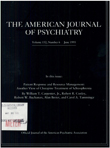Association of binge eating disorder and psychiatric comorbidity in obese subjects [published erratum appears in Am J Psychiatry 1993 Dec;150(12):1910]
Abstract
OBJECTIVE: The authors determined the prevalence of binge eating disorder in a self-referred study group of moderately and severely obese subjects and investigated whether binge eating disorder was associated with psychiatric disorders, a history of psychotherapy, a family history of psychiatric illness, or a history of sexual abuse. METHOD: They interviewed 89 obese women and 39 obese men (body mass index > 30 kg/m2) who were not currently in weight loss treatment, using the Binge Eating Disorder Clinical Interview, the Structured Clinical Interview for DSM-III-R, and the Structured Clinical Interview for DSM-III-R Personality Disorders. RESULTS: Forty-three (34%) of the subjects met criteria for binge eating disorder--33 women and 10 men. Black and white subjects had similar rates of binge eating disorder. Subjects with binge eating disorder were significantly more likely than those without the disorder to have a lifetime prevalence of a DSM-III-R axis I or axis II diagnosis and to have undergone psychotherapy or counseling. The lifetime rates of major depression, panic disorder, bulimia nervosa, borderline personality disorder, and avoidant personality disorder were all significantly higher in subjects with binge eating disorder. The rate of reported sexual abuse was not higher among subjects with binge eating disorder; however, they were significantly more likely to have a family history of substance abuse. The relative risks for psychiatric disorders were higher in both moderately and severely obese subjects with binge eating disorder than in those without the disorder. CONCLUSIONS: Among both moderately and severely obese subjects, binge eating disorder is associated with higher rates of axis I and axis II psychiatric disorders.
Access content
To read the fulltext, please use one of the options below to sign in or purchase access.- Personal login
- Institutional Login
- Sign in via OpenAthens
- Register for access
-
Please login/register if you wish to pair your device and check access availability.
Not a subscriber?
PsychiatryOnline subscription options offer access to the DSM-5 library, books, journals, CME, and patient resources. This all-in-one virtual library provides psychiatrists and mental health professionals with key resources for diagnosis, treatment, research, and professional development.
Need more help? PsychiatryOnline Customer Service may be reached by emailing [email protected] or by calling 800-368-5777 (in the U.S.) or 703-907-7322 (outside the U.S.).



